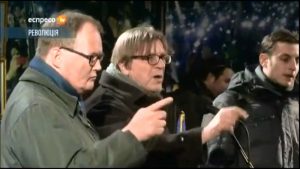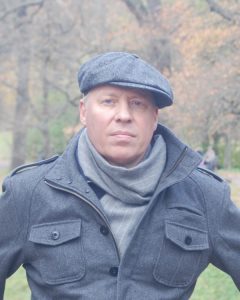Nederland herdenkt deze maand de ramp met de MH17. Twee jaar na dato is de schuldvraag nog steeds niet eenduidig beantwoord. De hoofdpersoon van Pieter Waterdrinkers roman Poubelle heeft daar minder moeite mee: die houdt vooral zichzelf verantwoordelijk. Een gesprek met correspondent-romancier Waterdrinker: over de moderne Europese geschiedenis, de Russische mentaliteit, de Grote Literatuur en de stront van het hedendaagse Europa.
In een wilde achtbaanrit van 544 pagina’s beschrijft Poubelle (Frans voor vuilnisbak) de belevenissen van Wessel Stols. Na een succesvolle reclamecarrière probeert hij vergeefs schrijver te worden. Als hij bovendien mislukt als louche handelaar in Sovjetkunst en zijn huwelijk vastloopt op kinderloosheid, belandt hij via een vriend in het Europarlement. Daar laaft hij zich aan buitenissige rijkdom, roem en seks. Toch brengt de geschiedenis hem opnieuw in het Oosten – in de conflicten in Oekraïne en op de Krim. Het wordt zijn ondergang.
Pieter Waterdrinker woont al twintig jaar in Rusland en maakte als correspondent de opstand in Kiev, de annexatie van de Krim en de ramp met MH17 van nabij mee.
Wat was er eerst: Wessel Stols of de geschiedenis?
‘‘Dat is ingewikkeld, een ondoorzichtig proces. Je hebt schrijvers die een boek echt bedenken, een schema maken, een plot. Zo werk ik niet. De gezichten kwamen in me op, en het decor ligt in de oorlog in Oekraïne. Ik ben daar zelf geweest, maar net als Wessel Stols kom ik ook regelmatig in Europa, Amsterdam, Parijs. Het is een kolking van indrukken en ervaringen, en die zijn een verbinding aangegaan. De gebeurtenissen riepen hem als het ware op.’
‘Poubelle is tijdloos, al speelt het in een bepaalde tijd. Neem Advocaat van de hanen van Adri van der Heijden; dat speelt in de jaren tachtig ten tijde van de krakersrellen, maar het is ook tijdloos. Ik vond het pervers om niet over de gebeurtenissen in Oekraïne te schrijven. Het kwam mij op het autobiografische pad; als één van de weinigen, terwijl wat er gebeurt zó belangrijk is voor het lot van de wereld en Europa.’
‘Maar het is ook een boek met veel verhaallijnen en thema’s uit eerder werk van mij. Ik heb niet gekozen voor non-fictie, omdat je daarin minder hoog kunt reiken. Het is een roman, het verhaal van Wessel Stols. De werkelijke geschiedenis moet je tussen de regels door lezen. Die gaat over het contemporaine Europa op drift, met terreur, vluchtelingen en geopolitieke gebeurtenissen die we niet meer kunnen negeren. Wist je dat er momenteel 31.000 NAVO-militairen oefenen in de Baltische staten? Hier lijkt dat allemaal veraf, maar daar houdt het iedereen bezig. De Russen zijn panisch voor de Amerikaanse trucks, vragen zich af: wat voor spel speelt de VS?’’
Van Baalen en Timmermans
Wessel Stols voelt zich medeverantwoordelijk voor de oorlog en daarmee ook voor de ramp met MH17, omdat hij als Europarlementariër op het Maidanplein de Oekraïners heeft opgeroepen zich bij Europa aan te sluiten. Dat hebben ook echte Europarlementariërs gedaan, onder anderen Hans van Baalen en Guy Verhofstadt. Heeft Van Baalen u al gebeld?
‘‘Van Baalen heeft me niet gebeld, nee. Nu moet ik ook zeggen dat de meeste mensen lang doen over 544 pagina’s, de reacties uit mijn omgeving komen nu pas los. Dat is wel raar hoor, veel schrijvers maken een tournee langs boekwinkels en krijgen direct reacties. Ik vertrek na het verschijnen van mijn boek weer naar Rusland en hoor niets meer. Af en toe denk ik: bestaat dat boek van mij eigenlijk wel? Daarom ben ik blij met sociale media, zo hoor ik toch wat mensen ervan vinden.’
‘Ik hoop voor Poubelle een beetje op Frans Timmermans. Die heeft zich over mijn laatste drie boeken op Facebook in lovende bewoordingen uitgelaten. Ik mag Timmermans graag, ben altijd verbijsterd over de energie, de tijd die hij vindt om zo veel te lezen. Ik vind het geweldig dat hij de moeite nam recensies van mijn werk te plaatsen. De laatste keer dat ik hem zag was op de ambassade in Kiev. Ik kan me niet voorstellen dat hij dit niet gelezen heeft; hij heeft ook een rol gespeeld in dit spel, al is Poubelle geen sleutelroman.’’

Bloot, kil materialisme
Wat begrijpt het Westen onvoldoende?
‘‘Er heerst een enorme onkunde in het Westen. Wij hebben een bepaald vooruitgangsdenken, dat erop neerkomt: zij worden als wij, of in elk geval zou dat moeten. Een land als Nederland leeft niet in zijn geschiedenis, Rusland wel. Vanuit ons blote, kille materialisme en ons vooruitgangsgeloof lopen wij vast in het prikkeldraad in Oekraïne. Wat Rusland doet is niet goed te keuren, maar als je het probeert te begrijpen, krijg je wel enig inzicht hoe ver het westen en Rusland uiteenlopen. In Moskou rijdt iedereen in westerse auto’s en de mensen zien er net zo uit als wij, maar als je in de hoofden kijkt, zijn zij en wij heel anders gericht. Volgens collega oud-correspondent Alexander Münninghoff komt dat door het schisma van 1054, toen de oostelijke en westelijke kerk van elkaar afgesplitst zijn. Rusland heeft daardoor geen renaissance en verlichting gekend.’
‘Ik neem geen stelling, maar ik laat alle kanten zien binnen het verhaal van de Werdegang van Wessel Stols. Daar kun je zelf uit opmaken dat Rusland niet deugt, maar dat Oekraïne ook niet deugt, en dat Brussel niet deugt met zijn domheid en hoogmoed.’’
Nederlandse journalisten leken activisten
Geen stelling nemen is toch ook een beetje stelling nemen?
‘‘Ja. Zeker na de MH17 leken veel Nederlandse journalisten meer op activisten! Ik wil afstand nemen van die polarisatie, en de mooiste manier daarvoor is een panoramisch boek schrijven.’’
Is Poubelle een Russische roman? Wessel Stols herinnerde me aan romanpersonages als Dostojevski’s Raskolnikov, ten onder gaand aan schuldgevoel, of Lermontovs Petsjorin, een overbodige mens die uit verveling anderen te gronde richt.
‘‘Dat gaat niet bewust, maar het is ook niet vreemd. Ik woon al twintig jaar in Rusland en ik ben gevoed en opgevoed door de Frans en Russische 19e-eeuwse literatuur. Mijn manier van schrijven is verhalend, Jeroen Vullings noemde dat in Vrij Nederland de “dreunende traditie” van de grote Russische schrijvers. De emoties zijn in Rusland altijd hoger, dieper, intenser dan in Nederland. Het Russische temperament lijkt op het Italiaanse. Ik ben daardoor als mens zelf ook emotioneler. Ik ben geen schrijver als de Nederlandse schrijvers: beheerst, onderkoeld. Geen “kale” schrijver.’’
Dubbelganger
Wessel Stols mislukt als schrijver, zijn vroegere klasgenoot Sander Brons gaat dat beter af. Ook begint hij een verhouding met Wessels vrouw Friedl. Wat is precies de rol van Brons?
‘‘Ja, dat is interessant. Je kunt zijn personage letterlijk nemen, maar je kunt je ook afvragen of Sander Brons wel bestaat, of hij niet de “betere ik” is van Wessel Stols. Alle kansen die Stols gemist heeft in het leven, vervult Sander Brons. Er is een passage waarin Wessel Stols voor het eerst na lange tijd weer bij zijn vrouw komt en op de kleerkast afstormt omdat hij denkt dat Sander Brons daarin zit, maar het is zijn eigen spiegelbeeld. Er is een duidelijk Doppelgängermotiv. Sander Brons is ook schrijver, misschien wel de schrijver van dit verhaal. Misschien lezen we de belevenissen van Wessel Stols wel gedirigeerd door Sander Brons.’’
Er zitten veel parallellen in het boek. Zo neemt Stols Sovjetkunst mee van een demente bejaarde, die in een Russisch verzorgingshuis in zijn eigen uitwerpselen zit. Later zit Stols als gevangene in een kelder in Oost-Oekraïne zelf in zijn eigen stront.
Varkenskop in jacquet
‘‘Wessel Stols’ ambitie is groter dan zijn talent, zowel in de kunst als in literatuur. Dat probeert hij te compenseren met seks en sociale status en zo belandt hij in de politiek. Ik zie veel mensen die in de politiek verzeild raken uit opportunisme. Maar de kunst geeft hij tot het laatst niet op. Als hij in die kelder wordt gegooid, gebeurt dat niet alleen met Wessel Stols; heel Europa wordt in die kelder gegooid, in de stront van de hypocrisie.’
‘Daar slaat de titel ook op: het hele leven om Wessel Stols heen is een vuilnisbak, de stank wordt gelicht van het huidige Europa. Zie ook het omslag, een man met een varkenskop in jacquet. Een rebel in Kiev zegt tegen hem: het leven is een vuilnisbak, een poubelle. Brussel is een vuilnisbak. En natuurlijk komt er ook de Parijse burgemeester Poubelle in voor die de straatvuilnisbak uitvond, en natuurlijk heet de rebellenleider in het boek Poubelle, maar de titel is duidelijk: alles is een stankbelt.’’

